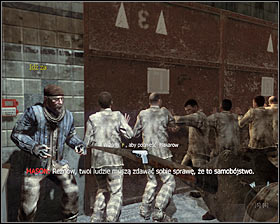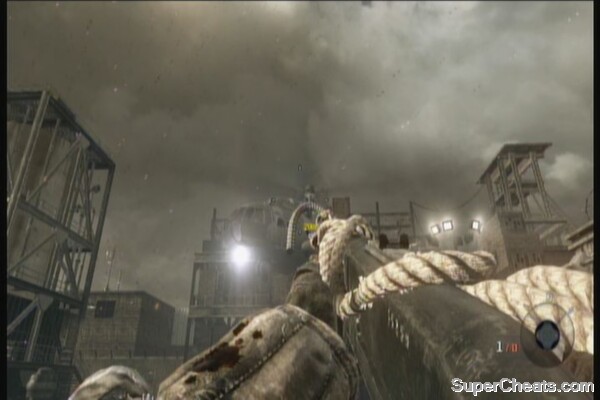This post has not been edited by the GamesBeat staff. Opinions by GamesBeat community writers do not necessarily reflect those of the staff.

Vorkuta, the second level of Call of Duty: Black Ops, is the game’s best mission and one of the finest of any Call of Duty title. You’re Alex Mason, trapped in the bowels of Vorkuta, a Soviet gulag labour camp. You join your fellow prisoners—led by the charismatic Viktor Reznov—in an escape attempt.
Step 1: Secure the keys
Reznov is punching you in the face, soundtracked by bloodthirsty cheers. This looks like the typical testosterone-fuelled violence of fictional prison culture, but when a single guard runs in to break up the fight, the attack’s true face is revealed. The guard turns to Viktor, and a prompt tells you to smash his head in with a rock. You oblige, then help up Reznov. The fight? Merely a ruse. Reznov, like Baldrick, has a cunning plan, and you’re part of it. Reznov announces, “Step one: secure the keys”.
There’s some efficient storytelling at work here. In these few seconds, you learn that you and Viktor are chums, and your familiarity suggests you’ve both been here for a while. Reznov’s carefully chosen dialogue (not just simply, “Secure they keys”) implies that, whatever is plan is, it’s rehearsed. He races off with the other prisoners through a tunnel, aiming for the surface. In call-and-response with the crowd he details the plan’s remaining steps. The crowd cheer and roar. I want in on this. I might be a 34-year-old man, alone with his PlayStation, covered in his own bile and urine, but Reznov’s motivational speech has worked on me. Right now I feel part of a group, united against an enemy.
Replaying Black Ops made me think of a film that came out after the game’s release: The Dark Night Rises. Both involve the hero making a vertical escape from darkness into the light while, along the way, possibly freeing a number of very dangerous people.
I replace the rock with a knife, the first of many weapon upgrades I’ll make during this level. Alarms ring, fires burn. I’ve played through Vorkuta a few times, and each time this part has unfolded slightly differently. Prisoners and guards battle; I can slay the guards or ignore them and run ahead, but if I hang around too long they’ll break through and attack me. If I rush through the tunnel, I’ll see man-beast named Sergei battle with three guards. If I arrive a little later, he’ll be fighting just one. If I take even more time, I won’t even see Sergei until later. Repeated play actually enhances, not detracts from, the feeling that Vorkuta is alive, and that this escape plan might go ahead without me.
Call of Duty games, like many shooters, are derided for their linearity. You can’t stray from your appointed path. Almost like being in a…tunnel. This level’s choice of location fits the game’s restrictive nature. The route I’m forced to follow while underground feels like a natural by-product of the environment—it’s not the game designers fault I have to follow this path, it’s the builders of the gulag. Also, with the crowd’s momentum and the game’s pace, I want to take the shortest route possible, a direct line to attack.

Step 2: Ascend from the darkness
There’s a pause in the action as we wait for the lift. I want to cheer when there’s a quiet moment in a Call of Duty game. Most of the rest of Black Ops will be taken up with repetitive, numbing action and noise. Bang boom bang boom bang. But these quiet moments serve to make the noisier ones more adrenaline-inducing. Right now there’s a nice quiet sense of anticipation.
The lift arrives and a dozen or so of us enter. I turn and look at my fellow prisoners in their filthy uniforms, their faces cut and scarred. I look at Sergei, who’s breathing deeply. Is he visualising tearing a guard in half?
The level is still in its early stages, but it already feels different from other shooters in a way I don’t at yet understand. The lift reaches the top. Through its caged door we watch a solitary guard try to hold back a horde of prisoners.
As the lift door opens and we rush the guard, I realise why this level feels so different from others: the normal roles have been reversed. Usually I’m the super-soldier, holding off the marauding masses with my superior weaponry and balls of steel. But today I’m just one of the many attackers, merely an escapee prisoner with a knife.
Sergei finishes the guard like Bullseye did Electra and we’re on the move again, climbing ever closer towards the light.
Step 3: Reign Fire
Mason joins in with the shouting when this step is announced. We’re finally about to escape the underworld. Sunlight awaits just outside a door. As does death. Call of Duty games have long tried to capture the brutality of Saving Private Ryan’s Omaha Beach scene. I think of that scene as prisoners pull the door open and are immediately torn down by machine gun fire.
Reznov, Sergei and I bolt for cover behind a coal cart. I collect a pistol and join them as they push the cart forward. Viktor calls out targets and I gun down guards. Some enemies take cover behind red barrels. Have they never played a game before?
Step 4: Unleash the horde
I make my way onto a roof. There’s a great sense of scale from up here—dozens of prisoners flee through the gulag while guards on roofs try to pick them off. Once again I feel like just one small cog in the escape machinery. An important cog, however, as I take down the gulag’s defenders with the deadliest weapon known to man: the catapult. I roll my eyes at the ease with which this improvised catapult strikes its target (if you do miss, a slight tilt on the y-axis is all you need to dead-eye your next attempt, on a target hundreds of feet away).
Reznov and I follow prisoners towards a building. The others turn off the path and climb a wall, but I have to move forward. In many games that would serve only to highlight how predetermined my route is. But here, with all the chaos and prisoners everywhere, it instead—weirdly—has the opposite effect. The others are following their plan as I must follow mine, and mine has a wee icon that’s telling me to enter this building.
Step 5: Skewer the winged beast

I like that the steps have vague titles. If this one was called “Step 5: wait for some guys to die and then pick up a weapon and shoot a helicopter and it’ll crash and that’s you done”, I’d be less far less intrigued. It’s here that Mason really gets sucked into Reznov’s plan—he’s starting to say the steps aloud to himself. Meanwhile, at home, I’m not far off doing it either.
This step is short. By the time it’s explained, it’s over. I head towards a roof again, where I can hear the roflroflrofl of a helicopter. There, two chaps are gunned down. Then the game does that Call of Duty thing, where the weapon you need is gently highlighted in bright gold in front of you. I pick up a harpoon gun and fire it at the choppah, which then crashes and explodes. Step complete, but there’s little feeling of satisfaction because it went by so quickly. I meet up with Reznov and Sergei again.
Back indoors we head towards another room. A shutter comes down. Sergei grabs it, allowing me to slide underneath it like Henry Jones, Jr. Sergei is gunned down, to Reznov’s anguished cries. I think of a gorilla dying in Gorillas in the Mist or Lennie in Of Mice and Men. I’ll get my revenge for what these guards did to sweet, murderous Sergei. If only I had, I don’t know, a fist of iron?
Step 6: Wield a fist of iron
I’m again unsure of what the step entails, but I’ve to protect Reznov. Which is easy enough, but then a door gets blown. Through the dust, armoured special forces enter. Memories of playing Black come to mind and my heart-rate rises. I panic and blind-fire and throw grenades that have more chance of hurting my comrades that my foes. I don’t function well under pressure. Somehow I survive.
Upstairs, Reznov is breaking through a door as more special forces arrive. I resume panicking, but then Rez gets the door open and encourages me to go in.
Oh my.
There’s a shiny and beautiful death machine, a sexy-ass mini-gun literally called Death Machine. For some reason Viktor doesn’t want to wear it, but I’ll try it on for size.
Step 7: Raise Hell
After playing the role of escapee prisoner/part of the horde for so long, now I’m back in a more regular role: supersoldier. Domination, baby. I step out onto Vorkuta’s paths, unafraid, and gun down everyone in sight. Trucks explode before their passengers get the chance to attack me. This is the most fun part of this game’s most fun level. But as enjoyable as it is, developers Treyarch had the sense to keep it short, before the destruction felt commonplace and Mason’s weighted-down pace became frustrating. Tear gas grenades detonate. I’m forced to flee, leaving Death Machine behind (farewell, my princess).
Step 8: Freedom
Reznov and I escape to a room. Handily, it contains two operable motorbikes. And two glass windows. Can you see where this is going?
If you’ve never tried it, you’d probably think shotgunning enemies with one hand while steering a motorbike at high-speed with the other would be difficult, right? Wrong (lol noob), it’s the easiest thing in the world. I gun down at least a dozen guards without missing. Treyarch knew the gamer would have a lot to concentrate on here, so they mostly took out having to aim. Fire the gun even vaguely in their direction and you’ll shoot a guard from their bike. Yet that doesn’t stops this step from being exhilarating.
I catch up with a truck. Reznov tells me to jump towards it, but them movement is taken out of my hands. Mason automatically leaps; I only regain control once he lands. The level has done so well into shutting off the rational parts of my brain and making me feel like I’m in control of Mason. Every time he jumped or climbed, I felt responsible. But then the game wrests that control away from me, and takes with it some sense of agency. When Mason then jumps onto a train, I’m given that control back, but the reminder of the game’s true author sticks. Mason escapes. Poor Viktor doesn’t. The level ends

I mostly enjoyed playing Black Ops, but the levels and missions all started to blur together into one big, long bullet frenzy. Vorkuta, however, stands out. There’s great sense of momentum to the game, you almost always feel like you’re rushing. This is an escape after all, not a paced attack. Speed is necessary. And the steps of the plan, announced at the beginning and repeated when each begins, keep clear what your objective is. So often in games—particularly shooters—you can so easily forget what your next goal is, instead focusing only on following a marker. Here, every stage is a discrete, bite-sized objective that feels different enough from the last while still fitting into the grander plan. That variation also applies to your weaponry—you go from rock to knife to machine gun to mini-gun before making your escape. In the samey world of Call of Duty gaming, Vorkuta stands out as original. Vorkuta for victory.
